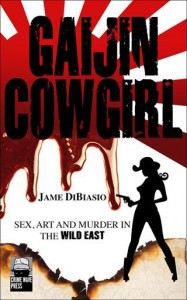 Jame DiBiasio is a Hong Kong-based American journalist who has recently published his debut novel, Gaijin Cowgirl (Crime Wave Press, 2013), and who keeps an Asian-themed blog at Asia Hacks. In this interview he talks about Japan, his book, the writing process, and plans for the future.
Jame DiBiasio is a Hong Kong-based American journalist who has recently published his debut novel, Gaijin Cowgirl (Crime Wave Press, 2013), and who keeps an Asian-themed blog at Asia Hacks. In this interview he talks about Japan, his book, the writing process, and plans for the future.
Voicu Mihnea Simandan: When did your interest in Japan begin?
Jame DiBiasio: The first time I visited Japan was for a business trip to, of all places, Fukuoka. This is the late 1990s and I hadn’t been in the region for very long, but had already spent time in developing countries. Japan was my first experience in Asia with a fully modern, high sophisticated society that was totally not Western – despite the occasional American veneer. Being a naïve foreigner, I had expected China to be a place of rigid conformity, and had already learned this was not the case. But Japan, despite its wealth and its modernity and its US affiliation, was marching to its own drummer’s beat. I had a great time but was totally confused. Soon I began to visit more regularly, and for longer periods; I was fortunate that for a few years, my work allowed me to do a deeper dive. I have never lost that initial sense of wonder about the place, and I hope I never do.
VMS: Travelers seem to think that the word ‘gaijin,’ just like ‘farang’ in Thai, is a pejorative Japanese word for “foreigner.” What’s your take on this?
JDB: ‘Gaijin’ is neutral, it has no negative meaning. There is however a more polite term for foreigners, ‘gaikokunjin’, so in the hierarchy of things, being called a ‘gaijin’ would not be receiving full respect. However there are ruder terms as well. Those you do not want to be called.
VMS: Gaijin Cowgirl takes the reader on a rollercoaster ride from the US to Tokyo, from Hong Kong to Bangkok and the Thai-Burmese border. How much travelling and research have you done for this book?
JDB: I took only one trip specifically for the book, which was to go from Bangkok to the Three Pagodas Pass along the Burmese border.
VMS: What inspired you to write this novel?
JDB: It was the adventure that I couldn’t believe hadn’t already been written. It’s a treasure hunt involving loot stolen during the war, as well as a missive on the abuses of both the Japanese and the American empires in the region, as well as a commentary on the role of women in Asian societies – the key was to show the underworld from a woman’s perspective. Asian crime fiction, such as it is, is too frequently about white guys mixing it up with ludicrous Asian femme fatales. My protagonist is Val Benson, a woman caught up in Japan’s ‘water trade’.
VMS: You’ve been a journalist for all your life, writing mostly about the finance world. Have you used any journalistic skills when writing Gaijin Cowgirl?
JDB: Not really, other than a commitment to accuracy where called for. But if anything, I had to unlearn how to be a journalist when I wrote the novel. They are different crafts with different aims, and whenever I slipped into journalist mode, the prose got very boring and I had to rip it up and start over.
 VMS: How do you balance your work as a fiction writer and a journalist? Where do the two meet?
VMS: How do you balance your work as a fiction writer and a journalist? Where do the two meet?
JDB: The two don’t meet. I get paid to be in financial publishing, and that is a 100% commitment. The fiction writing has to wait until I have free time, which usually means weekends and holiday. I don’t write about finance in my books. So the fiction writing is slower than I would like – but the discipline counts for more than the pace.
VMS: Gaijin Cowgirl has got a bit of everything for everyday and, until now, it has received very good reviews on Amazon… What do you know about your readers?
JDB: Thanks for saying so. My readers like crime fiction – thrillers, hardboiled, noir. There is a subset of readers who are attracted to the Asia setting, usually because they live here or have a connection to the region. I have a handful of Chinese readers too, because of my Hong Kong connection, but without translated versions the audience is going to be people comfortable with reading in English.
VMS: You live in Hong Kong… Do you visit Japan often?
JDB: Not as much as I would like anymore. I try to get there at least once a year.
VMS: Are you planning to write more Japan-based novels?
JDB: Probably. I am writing a sequel to Gaijin Cowgirl – the protagonist, Val Benson, is too good a character to let go. She is a party girl working as a hostess in a Tokyo gentleman’s club, but whose number-one tipper turns out to be trouble. She has some unfinished business there, so at some point I imagine she will go back.
VMS: Thank you for your time.
JDB: Thanks Mihnea, and good luck with the archery. Most of the weaponry in Gaijin Cowgirl has been knives and machine guns. Maybe I’ll need to add some bows and arrows.

